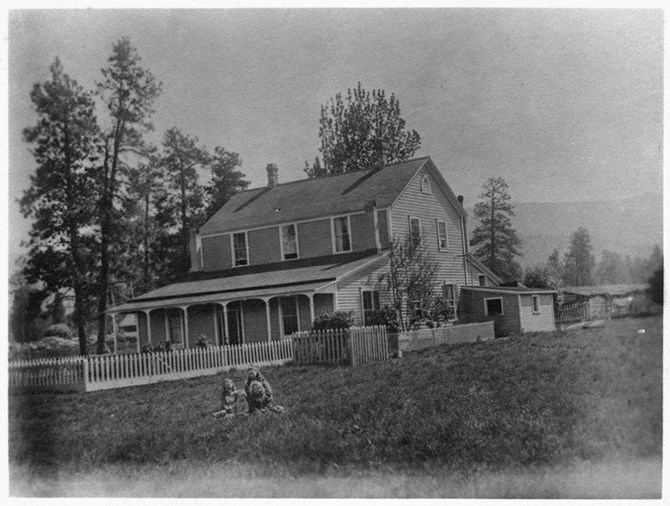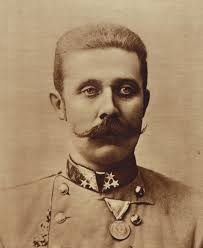
Ellis homestead in 1892 (the location today is on Windsor Ave. off Fairview Road in Penticton), looking much like what Archduke Ferdinand would have witnessed when he called on Penticton pioneer Tom Ellis for provisions for his hunting trip to Brent Mountain in 1893.
Image Credit: SUBMITTED/Penticton Museum and Archives
March 31, 2017 - 6:30 PM
PART TWO OF A FOUR PART SERIES
THE ARCHDUKE IS A HARD MAN TO SATISFY
Archduke Franz Ferdinand was told by local aboriginal guides he “couldn’t go wrong” on the hunt his party was planning up Shingle Creek on Sept. 12, 1893.
Ferdinand heard stories from the natives of a flock of 100 mountain sheep in the area, but remained pessimistic based on past experience, as he recorded in his diary, “the proclaimed abundance of game was often far from reality.”
The hunt got off to a bad start, adding to the litany of grumbles and complaints for the Austrian royal, in line to inherit an empire, and clearly more accustomed with getting his way. Ferdinand recorded his frustrations with the natives, blaming them for a late start.
"Unfortunately here too punctuality seemed to be an unknown virtue, as when I left my cabin after 9 O’clock neither pack horses nor Indians were to be seen. Finally individual redskins appeared, riding totally unhurriedly,” he wrote, in the vernacular of the day.
READ PART ONE OF THE SERIES HERE:
Before his 1914 assassination ignited WWI, Archduke Ferdinand was one of the Okanagan's first tourists
In spite of Ferdinand's difficulties in dealing with the natives on a personal level, he also demonstrated an understanding of the plight of North American natives beyond that of most European whites in the late 20th century, for he also notes:
"The Indians of North America, the aboriginal people of the land, had been numerous and powerful still during the last century but have seen an unstoppable decline during the present era, as the prospering of the redskins as hunter, fishermen and warrior peoples seemed incompatible with the rapid advance of modern civilization. Forced to put away their weapons and displaced from their hunting grounds once so rich in game to designated places, reservations, this people is decaying more and more and faster, for whose blossoming apparently freedom is a vital requirement as the evils of civilization have reached it much faster than the blessings of civilization. Illnesses of all kinds, alcoholism and corruption made a quick entrance and gained distribution among the redskins in the modern period of North America. In contrast only in a limited way were efforts successful to civilize the Indians, to convert them to Christianity, to make them sedentary and turn them into efficient tillers.

Archduke Franz Ferdinand
Image Credit: Wikimedia commons
In Canada, by the way, the situation of the Indians is much more favorable and their progress in civilization much greater than in the United States. This expresses itself not only in the numerical, moral and material relations of the Indians but also through their attitude they display towards the owners of the territories..."
Ferdinand had issues with pioneer Thomas Ellis, as well, who he was relying on to supply the hunt.
"Mr. Ellis, the only owner of property in this region, who was responsible for the supply of horses and Indians acting as guides and hunters did not seem eager and was quite disconcerted about our whole expedition,” Ferdinand recorded about the Penticton rancher.
He noted Ellis' Scottish heritage, writing that Ellis owned the surrounding area, including thousands of square kilometres.
He also described the local natives' relationship with Ellis as “vassal-like."
'WITH SUSPICIOUS EYES DOES HE OBSERVE... THE CANADIAN PACIFIC RAILWAY'
Ferdinand saw Ellis as ego-driven, describing him as a man who “loved to feel and show himself as the king of this small country."
He also saw Ellis as jealously protective of his domain.
"With suspicious eyes does he observe the advances and successes of the Canadian Pacific railway company into this endless wilderness where he up to now had been the unique ruler and could act as he pleased during the last 28 years,” Ferdinand writes, seeing Ellis as having a ready distrust of strangers, including Ferdinand and his hunting party.
Nevertheless, Ferdinand did concede that he was forced to “grin and bare” Ellis’ treatment because of his dependence on the rancher to supply the party, referring to Ellis somewhat sarcastically as “the mighty man."
Maurice Williams, a history professor emeritus from UBCO, says two dominant ideas of the day were behind Ferdinand’s interpretation of what he saw, and is reflected in his journal writings.
“Europeans had a strong sense of superiority, both culturally and biologically. The 1890s was an era of racism based on biological principles,” Williams says, adding Ferdinand viewed himself as highly superior to others, but at the same time held ideals about the “noble savage.”
He believed natives of the day were untainted by the corruption of the church.
"His writings indicate he expected more of them, but at the same time, he looked down on them,” Williams says.
Ferdinand’s supply train headed up Shingle Creek around mid-morning, Sept. 12.
He and his hunting party had to wait until 11 a.m. for their horses and shot four osprey to kill time as they lounged on the waterfront.
Once on the trail, Ferdinand turned his critiques to his equipment and again to the native population, complaining about uncomfortable Mexican saddles and North American horse tack.
His guides were all natives "from the local tribe of 150.”
Ferdinand crossed a fast flowing Okanagan River into the Indian village which he described as "consisting partly of huts, partly of wigwams that are tents.”
'TREES, CARRYING MANY FRUITS'
He described the native huts as simple log houses covered by grass tiles and the wigwams as “distinguishable only by the chaos ruling their interior" but offers no further explanation of that observation.
Ferdinand observed several natives were apparently making fortunes raising cattle, while small fields and a fruit garden “where we saw to our surprise, trees carrying very many fruits” also caught his attention.
The hunting party made their way up Shingle Creek, riding what Ferdinand described as “just-caught mustangs, that lay down at every opportunity.”
He feared the party’s wine reserves, rifles and photographic equipment were in “great danger” from the horses’ behaviour.
Ferdinand didn’t care for the way the natives treated the horses, commenting in his journal that no love was shown in their care, and they were “used and exploited as much as possible by the natives.”
The group set up camp at the edge of Shingle Creek a few hours later, Ferdinand’s party separate from the native guides.
Trees were cut, a huge bonfire lit, both groups cooked their meals. Ferdinand noted the natives had their meal prepared faster than the Europeans, who he said had too many cooks involved in the preparations.
Although Ferdinand commented in his journal that he would rather be on this “happy hunting trip” than on an official voyage with an excellent dinner and comfortable bed, he nonetheless noted in the tent he singularly occupied that night, he had to wrap himself in furs to keep from freezing during the cold night.
Next: Hopes to shoot a grizzly are dashed when Ferdinand is forced to cut the hunting trip short due to a cold. The four day outing into the wild Okanagan results in the shooting of a few mule deer and some grouse.On the way back to Penticton, Ferdinand has an opportunity to see how the natives live.
To contact a reporter for this story, email Steve Arstad or call 250-488-3065 or email the editor. You can also submit photos, videos or news tips to the newsroom and be entered to win a monthly prize draw.
We welcome your comments and opinions on our stories but play nice. We won't censor or delete comments unless they contain off-topic statements or links, unnecessary vulgarity, false facts, spam or obviously fake profiles. If you have any concerns about what you see in comments, email the editor in the link above.
News from © iNFOnews, 2017